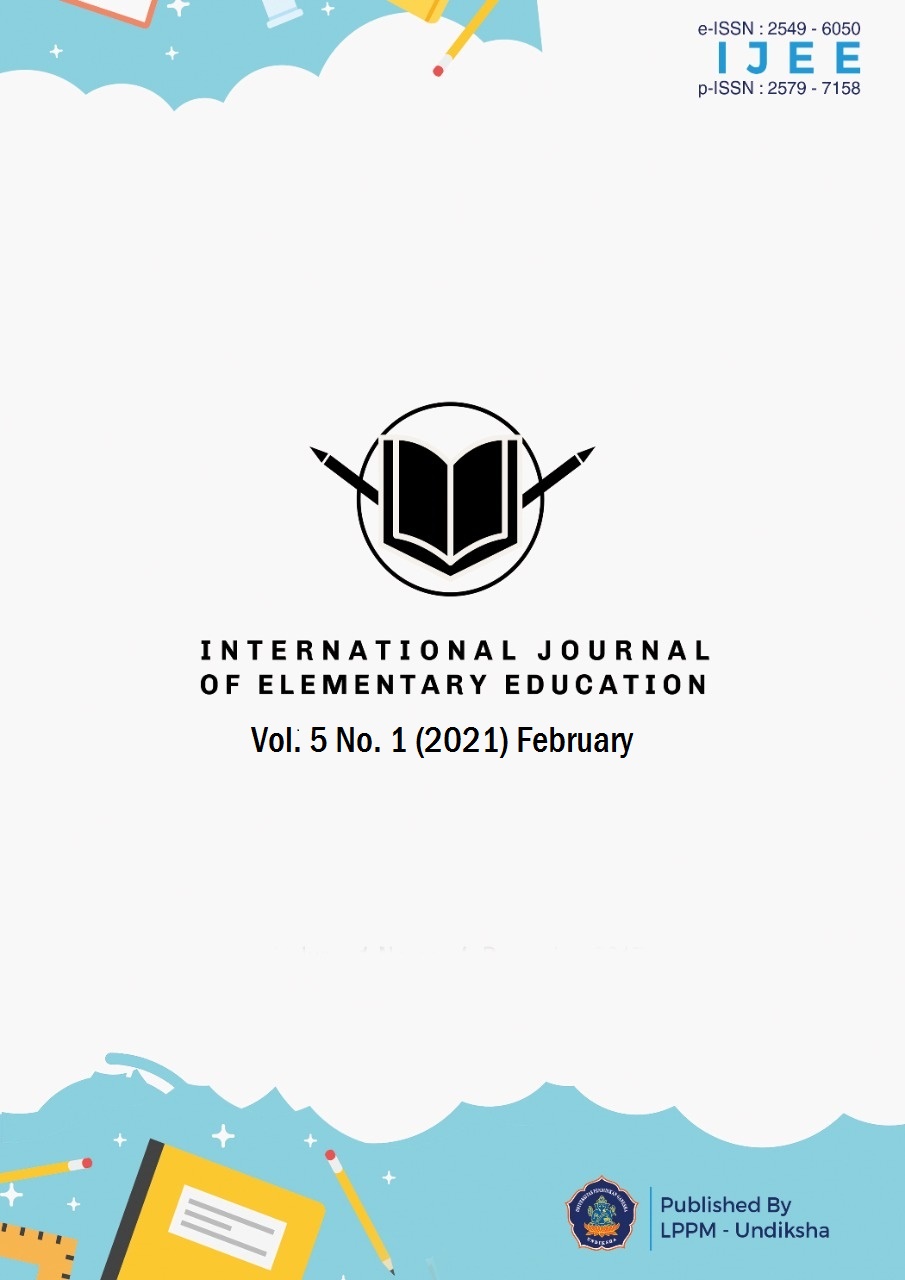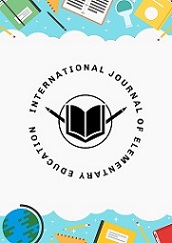Application of The Discovery Learning Model Assisted by Google Meet to Improve Students' Critical Thinking Skills and Science Learning Outcomes
DOI:
https://doi.org/10.23887/ijee.v5i1.34344Keywords:
critical thingking, learning outcomesAbstract
The Covid-19 pandemic situation has hampered the learning process. This can have a negative effect on the quality of the science learning output. This study aims to describe critical thinking skills and science learning outcomes through the application of the discovery learning model assisted by the Google Meet application. This type of research is Classroom Action Research (PTK) which consists of four stages, namely planning, implementing, observing, and reflecting. The subjects in this study were 15 students. The research instrument used was the critical thinking skills observation sheet and the learning outcome test sheet. The results showed that critical thinking skills in the pre-cycle stage were 52.33, cycle I 60.17, and cycle II 69.17. Then, the completeness of student learning outcomes in the pre-cycle is 60.00%, the first cycle is 73.33%, and the second cycle is 86.67%. Based on this, it can be concluded that learning with the discovery learning model assisted by the Google Meet application can improve critical thinking skills and science learning outcomes. The results of this study have implications for finding solutions to improve the quality of science learning output.
References
Abidah, A., Hidaayatullaah, H. N., Simamora, R. M., Fehabutar, D., & Mutakinati, L. (2020). The Impact of Covid-19 to Indonesian Education and Its Relation to the Philosophy of “Merdeka Belajar.” Studies in Philosophy of Science and Education, 1(1), 38–49. https://doi.org/https://doi.org/10.46627/sipose.v1i1.9.
Agustihana, S., & Suparno. (2018). Effectiveness of Physics Mobile Learning Media to Improve Higher Order Thinking Skills of Students in Thermodynamics. Journal of Physics: Conference Series, 1097(1). https://doi.org/10.1088/1742-6596/1097/1/012031.
Almaiah, M. A., Al-Khasawneh, A., & Althunibat, A. (2020). Exploring the critical challenges and factors influencing the E-learning system usage during COVID-19 pandemic. Education and Information Technologies, 25(6), 5261–5280. https://doi.org/10.1007/s10639-020-10219-y.
Anugrahana, A. (2020). Hambatan, Solusi dan Harapan: Pembelajaran Daring Selama Masa Pandemi Covid-19 Oleh Guru Sekolah Dasar. Scholaria: Jurnal Pendidikan Dan Kebudayaan, 10(3), 282–289. https://doi.org/10.24246/j.js.2020.v10.i3.p282-289.
Arikunto, S. (2006). Metode Penelitian Kualitatif. Bumi Aksara.
Basilaia, G., & Kvavadze, D. (2020). Transition to Online Education in Schools during a SARS-CoV-2 Coronavirus (COVID-19) Pandemic in Georgia. Pedagogical Research, 5(4). https://doi.org/10.29333/pr/7937.
Bozkurt, A., Jung, I., Xiao, J., Vladimirschi, V., Schuwer, R., Egorov, G., Lambert, S., Al-Freih, M., Pete, J., Olcott Jr., D., Rodes, V., Aranciaga, I., Bali, M., Alvarez Jr., A., Roberts, J., Pazurek, A., Raffaghelli, J., Panagiotou, N., de Coëtlogon, P., … Paskevicius, M. (2020). A global outlook to the interruption of education due to COVID-19 Pandemic: Navigating in a time of uncertainty and crisis. Asian Journal of Distance Education, 15(1), 1–126. https://doi.org/10.5281/zenodo.3878572.
Cahyani, A., Listiana, I. D., & Larasati, S. P. D. (2020). Motivasi Belajar Siswa SMA pada Pembelajaran Daring di Masa Pandemi Covid-19. IQ (Ilmu Al-Qur’an): Jurnal Pendidikan Islam, 3(01), 123–140. https://doi.org/https://doi.org/10.37542/iq.v3i01.57.
Cho, M. J., & Hong, J. P. (2021). The emergence of virtual education during the COVID-19 pandemic: The past, present, and future of the plastic surgery education. Journal of Plastic, Reconstructive and Aesthetic Surgery, xxxx. https://doi.org/10.1016/j.bjps.2020.12.099.
Dewi, W. A. F. (2020). Dampak Covid-19 Terhadap Implementasi Pembelajaran Daring Di Sekolah Dasar. Jurnal Ilmu Pendidikan, 2(1), 55–61. https://doi.org/https://doi.org/10.31004/edukatif.v2i1.89.
Dwivedi, Y. K., Hughes, D. L., Coombs, C., Constantiou, I., Duan, Y., Edwards, J. S., Gupta, B., Lal, B., Misra, S., Prashant, P., Raman, R., Rana, N. P., Sharma, S. K., & Upadhyay, N. (2020). Impact of COVID-19 pandemic on information management research and practice: Transforming education, work and life. International Journal of Information Management, 55, 102211. https://doi.org/10.1016/j.ijinfomgt.2020.102211.
Grussendorf, J., & Rogol, N. C. (2018). Reflections on Critical Thinking: Lessons from a Quasi-Experimental Study. Journal of Political Science Education, 14(2), 151–166. https://doi.org/https://doi.org/10.1080/15512169.2017.1381613.
Kartikaningtyas, V., Kusmayadi, T. A., & Riyadi. (2017). Contextual Approach with Guided Discovery Learning and Brain Based Learning in Geometry Learning. Journal of Physics: Conference Series, 895(1). https://doi.org/10.1088/1742-6596/895/1/012024.
Khofiyah, H. N., Santoso, A., & Akbar, S. (2019). Pengaruh Model Discovery Learning Berbantuan Media Benda Nyata terhadap Kemampuan Berpikir Kritis dan Pemahaman Konsep IPA. Jurnal Pendidikan: Teori, Penelitian, Dan Pengembangan, 4(1), 61–67. https://doi.org/https://doi.org/10.1080/15332276.2014.11678425.
Nakayama, M., Yamamoto, H., & Santiago, R. (2007). Relationship between learner characteristics and learning performance in hybrid courses among Japanese students. Elektronic Journal ELearning, 5(3), 195–206. https://doi.org/http://dx.doi.org/10.4018/IJDET.2016010105.
Nurhayati, S., Wicaksono, M. F., Lubis, R., Rahmatya, M. D., & Hidayat, H. (2020). Peningkatan Kemampuan Guru Dalam Pembelajaran Daring Dengan Memanfaatkan Teknologi Informasi Bagi Guru SMA Negeri 5 Cimahi Bandung. Indonesian Community Service and Empowerment (IComSE), 1(2), 70–76. https://doi.org/https://doi.org/10.34010/icomse.v1i2.3878.
Pamungkas, G. H., Harjono, N., & Airlanda, G. S. (2019). Peningkatan Proses Dan Hasil Belajar Ipa Kelas 5 Tema 6 Subtema 3 Dengan Model Pembelajaran Discovery Learning. Jurnal Basicedu, 3(1), 43–46. https://doi.org/10.31004/basicedu.v3i1.64.
Patrianingsih, E. A., & Kaseng, E. S. (2016). Model Pembelajaran Discovery Learning , Pemahaman Konsep Biologi, dan Sikap Ilmiah Peserta Didik. Jurnal Penelitian Pendidikan Insani, 19(2), 74–86.
Prasasti, D. E., Koeswanti, H. D., & Giarti, S. (2019). Peningkatan Keterampilan Berpikir Kritis Dan Hasil Belajar Matematika Melalui Model Discovery Learning Di Kelas IV SD. Jurnal Basicedu, 3(1), 174–179. https://doi.org/https://doi.org/10.31004/basicedu.v3i1.113.
Purwanto, A., Pramono, R., Asbari, M., Santoso, P. B., Wijayanti, L. M., Hyun, C. C., & Putri, R. S. (2020). Studi Eksploratif Dampak Pandemi COVID-19 Terhadap Proses Pembelajaran Online di Sekolah Dasar. Journal Og Education, Psychology and Counseling, 2(1–12). https://ummaspul.e-journal.id/Edupsycouns/article/view/397.
Rimbarizki, R., & Susilo, H. (2017). Penerapan Pembelajaran Daring Kombinasi Dalam Meningkatkan Motivasi Belajar Peserta Didik Paket C Vokasi Di Pusat Kegiatan Belajar Masyarakat (Pkbm) Pioneer Karanganyar. J+Plus Unesa, 6(2), 1–12.
Sadikin, A., & Hamidah, A. (2020). Pembelajaran Daring di Tengah Wabah Covid-19. Jurnal Ilmiah Pendidikan Biologi, 6(02), 214–224. https://doi.org/10.22437/bio.v6i2.9759.
Setyorini, I. (2020). Terhadap Proses Pembelajaran Pada Kurukulum 13 ? Jiemar: Journal of Industrial Engineering & Management Research, 01(Juni), 95–102. https://doi.org/https://doi.org/10.7777/jiemar.v1i1.
Simamora, R. M. (2020). The Challenges of Online Learning during the COVID-19 Pandemic: An Essay Analysis of Performing Arts Education Students. Studies in Learning and Teaching, 1(2), 86–103. https://doi.org/10.46627/silet.v1i2.38.
Sujarwo, S., Sukmawati, S., Akhiruddin, A., Ridwan, R., & Suharti Siradjuddin, S. S. (2020). An Analysis of University Students’ Perspective On Online Learning in The Midst of Covid-19 Pandemic. Jurnal Pendidikan Dan Pengajaran, 53(2), 125. https://doi.org/10.23887/jpp.v53i2.24964.
Susilowati, E. (2020). Bagaimana Pembelajaran Daring di Tengah Wabah Covid 19 melalui Grup WhatsApp ? Jurnal Pendidikan Matematika Raflesia, 05(03), 1–25. https://doi.org/https://doi.org/10.33449/jpmr.v5i3.12896.
Utami, Y. S. (2013). Peran Guru Dalam Menciptakan Pembelajaran Alam Kelas V Di Sekolah Dasar Negeri Kranggan 2 Kota Mojokerto. Universitas Islam Negeri Maulana Malik Ibrahim.
Wahyuni, V. N. (2021). Efektifitas Penggunaan Google Meet Dalam Pembelajaran Daring Terhadap Peningkatan Hasil Belajar Siswa Kelas V SD Al-Islam Plus Krian Sidoarjo. UIN Sunan Ampel.
Wijayanengtias, M., & Claretta, D. (2020). Student Perceptions of Online Learning During the Covid-19 Pandemic. Kanal: Jurnal Ilmu Komunikasi, 9(1), 16–21. https://doi.org/10.21070/kanal.v9i1.685.
Xue, Q., Xie, X., Liu, Q., Zhou, Y., Zhu, K., Wu, H., Wan, Z., Feng, Y., Meng, H., Zhang, J., Zuo, P., & Song, R. (2021). Knowledge, attitudes, and practices towards COVID-19 among primary school students in Hubei Province, China. Children and Youth Services Review, 120(November 2020), 105735. https://doi.org/10.1016/j.childyouth.2020.105735.
Zaharah, Kirilova, G. I., & Windarti, A. (2020). Impact of Corona Virus Outbreak Towards Teaching and Learning Activities in Indonesia. Salam: Jurnal Sosial Dan Budaya Syar’i, 7(3), 269–282. https://doi.org/http://doi.org/10.15408/sjsbs.v7i3.15104.
Downloads
Published
How to Cite
Issue
Section
License
Authors who publish with the International Journal of Elementary Education agree to the following terms:
- Authors retain copyright and grant the journal the right of first publication with the work simultaneously licensed under a Creative Commons Attribution License (CC BY-SA 4.0) that allows others to share the work with an acknowledgment of the work's authorship and initial publication in this journal.
- Authors are able to enter into separate, additional contractual arrangements for the non-exclusive distribution of the journal's published version of the work (e.g., post it to an institutional repository or publish it in a book), with an acknowledgment of its initial publication in this journal.
- Authors are permitted and encouraged to post their work online (e.g., in institutional repositories or on their website) prior to and during the submission process, as it can lead to productive exchanges, as well as earlier and greater citation of published work. (See The Effect of Open Access)










